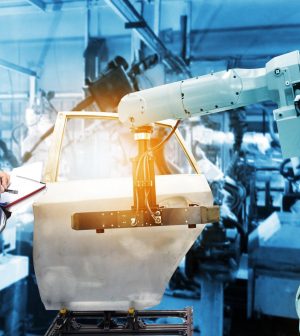- Could Your Grocery Store Meat Be Causing Recurring UTIs?
- Are You Making This Expensive Thermostat Error This Winter?
- Recognizing the Signs of Hypothyroidism
- 10 Strategies to Overcome Insomnia
- Could Artificial Sweeteners Be Aging the Brain Faster?
- Techniques for Soothing Your Nervous System
- Does the Water in Your House Smell Funny? Here’s Why
- Can a Daily Dose of Apple Cider Vinegar Actually Aid Weight Loss?
- 6 Health Beverages That Can Actually Spike Your Blood Sugar
- Treatment Options for Social Anxiety Disorder
Company Behind Defective CPAP Machines Must Make Changes Before U.S. Production Resumes

Phillips Respironics, the company responsible for the recall of millions of defective sleep apnea machines since 2021, must overhaul its production of the machines before it can resume making them in the United States, federal officials announced Tuesday.
Under a settlement reached with the company, Phillips must revamp its manufacturing and quality control systems and hire independent experts to vet the changes. Phillips must also continue to replace, repair or provide refunds to all U.S. customers who got defective devices, the court order stated.
The action helps resolve one of the biggest medical device recalls in history, which has dragged on for nearly three years and involved 15 million devices worldwide, the U.S. Food and Drug Administration said.
“The finalization of this decree is a significant milestone. Throughout this recall, we have provided patients with important health information by issuing numerous safety communications and have taken actions rarely used by the agency to help protect those impacted by this recall,” Dr. Jeff Shuren, director of the FDA’s Center for Devices and Radiological Health, said in an agency news release. “Today’s action is a culmination of those efforts and includes novel provisions aimed at helping ensure that patients receive the relief they have long deserved.”
Most of the devices that have been recalled are continuous positive airway pressure (CPAP) machines. These devices force air through a mask to keep a patient’s mouth and nasal passageways open during sleep. Left untreated, sleep apnea can increase the risk of heart attack.
With the recalled machines, foam inside the machine can break down over time, leading users to inhale tiny particles and fumes while they sleep.
Jeffrey Reed, of Marysville, Ohio, experienced sinus infections and two bouts of pneumonia during the seven years he used a Philips CPAP machine.
“I worry about my long-term health,” Reed told the Associated Press. “I used this machine for years and no matter what money I might get out of this, what’s going to happen?”
Reed received a newer Philips device after returning his old machine, but he prefers a competitor’s device.
“I don’t trust the company,” Reed said. “I don’t want to use it.”
Reed is one of more than 750 people who have filed personal injury lawsuits against the company over the devices. Those cases have been consolidated in a federal court in Pennsylvania, the AP reported.
More information
Visit the National Institutes of Health for more on sleep apnea.
SOURCES: U.S. Food and Drug Administration, news release, April 10, 2024; Associated Press
Source: HealthDay
Copyright © 2026 HealthDay. All rights reserved.










